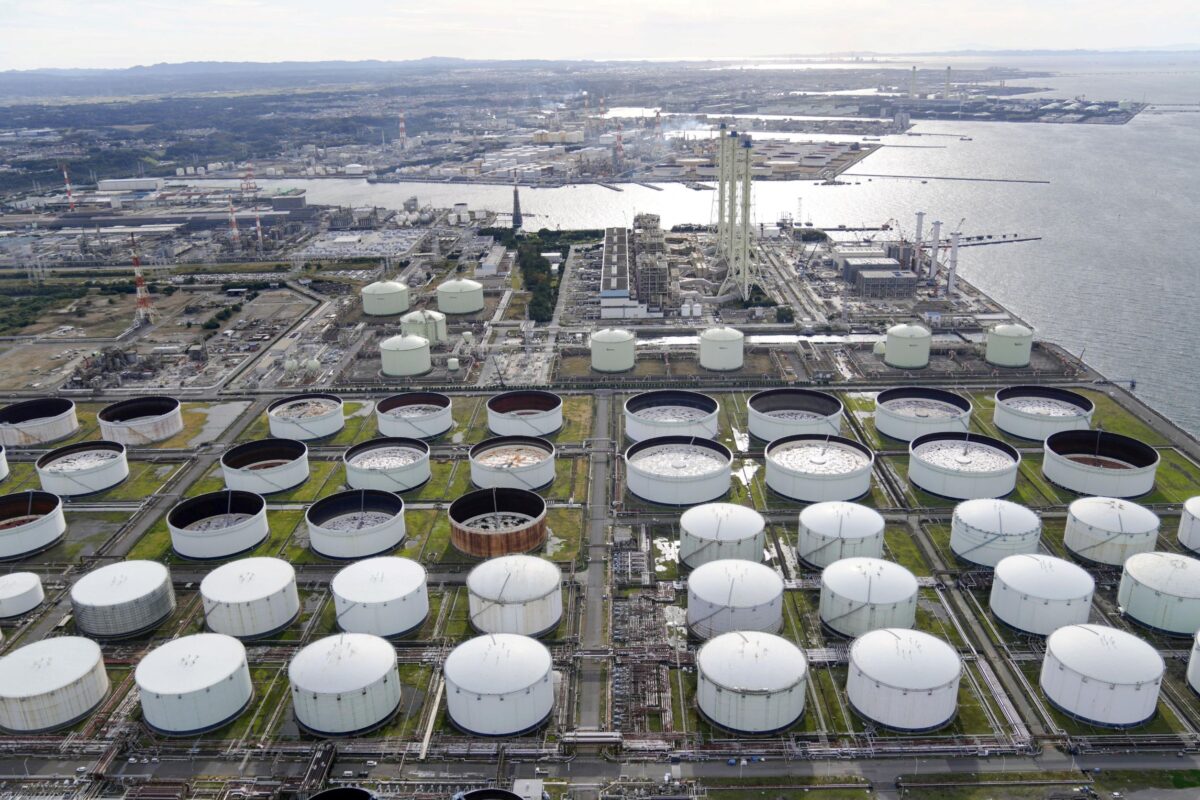
Above Photo: Indigenous activists speak during a protest at JPMorgan Chase offices in Glasgow.
‘Shame On You.’
The major American bank is helping fund the Coastal Gaslink pipeline, which threatens First Nation lands in Canada.
Glasgow, Scotland — Indigenous activists on Wednesday staged a protest outside JPMorgan Chase headquarters in central Glasgow as pressure on banks to halt oil and gas extraction grows.
A crowd of over a hundred chanted “enough is enough” and “shame on you” outside the American multinational bank’s office building, just over a mile from where crucial talks at the COP26 climate conference are currently taking place.
JPMorgan Chase is the world’s biggest financier of fossil fuels, according to environmental organisations. In 2020 the bank pledged to end fossil fuel loans for Arctic oil drilling and phase out loans for coal mining. However, a recent report shows the bank provided £230 billion in support for fossil fuels between 2016-2020. A DeSmog investigation also found that every one of Chase’s board of directors had connections to polluting industries.
This includes the Coastal Gaslink pipeline being constructed in British Columbia, Canada, which is set to cross through Indigenous lands and is threatening vital ecosystems.
Speakers also criticised Line 3, a proposed pipeline expansion to bring nearly a million barrels of tar sands oil per day from Alberta in Canada to Wisconsin, part-funded by JPMorgan.
“Banks need to stop financing fossil fuels, because they are killing our people and they are killing our territory,” Nemo Andy Guiquita, director of women and health for the confederation of Indigenous nationalities of the Ecuadorian Amazon (CONFENIAE), told the crowd.
Fossil Finance
Around 30 frontline Indigenous activists led the press conference, holding “Air back” and Ice back” banners. As fossil-fuel caused climate change and the physical impacts of oil and gas extraction increasingly threaten essential ecosystems, Indigenous communities around the world are calling for land, ice and air stewardship to be returned back to them from non-Indigenous control.
A huge banner with JPMorgan Chase’s logo and “Blood money” in dripping red paint was also held directly under the building entrance.
Community members from the Wet’suwet’en First Nation in British Columbia, Canada, and Sarayaku and Waorani Indigenous groups in the Ecuadorian Amazon highlighted the impact of extraction and destruction on their communities.
Delee Nikal, a representative of the Wet’suwet’en people, addressed the crowd about the Coastal Gaslink liquified natural gas pipeline, a controversial project by TC Energy part-financed by JPMorgan which would run through their lands.
“We are fighting against the pipelines, against the capitalist institutions,” said Nikal. “They are taking our trees and destroying them.”
Wet’suwet’en land defenders have been protesting against the Coastal Gaslink pipeline’s construction for nearly two years. In early 2020, the fight to stop the pipeline saw Indigenous people and their supporters blockade rail lines across Canada and violent police raids of protest camps along the pipeline’s route. Tensions began to flare up once again in October in an effort to prevent the company from drilling under a river that is part of an important salmon watershed.
Nikal also referred to a recorded rise in violence against women on territories where loss of land has made them more vulnerable to sexual violence, exploitation, and trafficking.
“There’s no way I should ever have to feel unsafe in our territories,” she told the crowd. “Our women have gone missing or are murdered and we shouldn’t have to shout alone.”
Climate Change
The continued extraction of oil and gas is the primary contributor to emissions driving climate change, yet talks among national delegates at COP26 to bring an end to this have met with obstacles at the ongoing climate conference.
Indigenous peoples have contributed least to global heating, yet are among those most impacted by climate change. Rising global temperatures are already wreaking a devastating impact on ecosystems such as forests and rivers that provide a cultural, spiritual and physical home to communities.
Guiquita, of the Waorani people in Ecuador, told those attending that she had come to Glasgow during COP26 due to the urgency of the issue. “Today I am very far away from my home and from ancestral territories, but the rainforest is dying,” she said. “It is being destroyed by oil companies that continue to destroy and cut down trees, and they’re destroying the last rainforest we have left.”
JPMorgan is one of five major financial institutions to have invested a combined $6 billion in oil extraction projects in the western Amazon between 2017 and 2019, according to a study published by the NGO Amazon Watch.
Net Zero
Speakers also referred to the “false solution” of net zero, noting that JPMorgan last month joined the Mark Carney-chaired Net Zero Banking Alliance, a pledge to align its lending and investment portfolios with net-zero emissions by 2050.
JPMorgan, which had previously declined to join the alliance, aims to reduce its operational carbon intensity by 35 percent by 2030, but activists say the bank’s status as the world’s biggest financier of fossil fuels undermines its credibility.
“We need to stop financing oil and gas, we need to keep fossil fuels in the ground,” said Maricela Gualinga, vice president of the Kichwa Sarayaku Peoples of the Ecuadorian Amazon.
“Net zero is not the solution, it has got us into climate change in the first place.”
JP Morgan declined to comment.
Related posts:
Views: 0
 RSS Feed
RSS Feed

















 November 13th, 2021
November 13th, 2021  Awake Goy
Awake Goy 



 Posted in
Posted in  Tags:
Tags: 
















